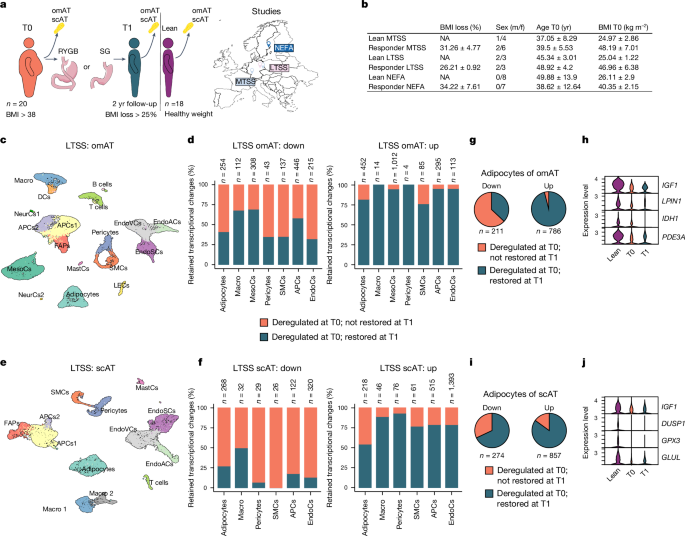How might understanding the epigenetic memory of obesity influence public health policies and interventions aimed at addressing the obesity epidemic?
Understanding the epigenetic memory of obesity could significantly influence public health policies and interventions in several ways:
Shifting focus from weight loss to metabolic health: Current strategies often emphasize weight loss as the primary goal. However, recognizing the persistence of the "obesogenic memory" highlights the importance of metabolic health as a distinct and crucial target. Public health policies could prioritize interventions that improve metabolic function, even in individuals who struggle to maintain significant weight loss.
Early intervention: The study emphasizes that epigenetic changes occur in response to obesity. This underscores the importance of early intervention strategies, particularly in childhood and adolescence, to prevent or delay the establishment of this obesogenic memory. Policies could focus on promoting healthy lifestyles and preventing childhood obesity to mitigate long-term health risks.
Personalized approaches: The discovery of epigenetic changes opens avenues for more personalized approaches to obesity management. Future interventions could involve identifying individuals with specific epigenetic markers associated with increased risk of weight regain or metabolic dysfunction. This could allow for tailored dietary and lifestyle recommendations or even the development of targeted therapies.
Public awareness and education: Raising public awareness about the concept of obesogenic memory and its long-term health implications is crucial. Educational campaigns can help individuals understand that obesity is not simply a matter of willpower but involves complex biological mechanisms. This understanding can empower individuals to make informed decisions about their health and advocate for supportive policies.
Research and development: Further research is needed to fully understand the mechanisms of epigenetic memory in obesity and explore potential therapeutic targets. Public health policies can support funding for research aimed at developing novel interventions that address the epigenetic component of obesity, such as drugs that modify gene expression or reverse detrimental epigenetic changes.
Could there be other factors beyond epigenetics, such as changes in the gut microbiome or hormonal profiles, that contribute to the obesogenic memory and weight regain?
Yes, absolutely. While the study highlights the role of epigenetics in obesogenic memory, it's crucial to recognize that this is not the only factor at play. Weight regain and the body's response to weight loss are complex processes influenced by a network of interacting systems. Here are some other key contributors:
Gut microbiome: The gut microbiome, the vast community of microorganisms living in our intestines, plays a significant role in metabolism, energy extraction from food, and appetite regulation. Studies have shown that obesity is associated with alterations in the gut microbiome composition. These changes can persist even after weight loss and may contribute to weight regain by influencing energy harvest and signaling pathways related to hunger and satiety.
Hormonal profiles: Hormones like leptin and ghrelin, which regulate appetite and energy expenditure, are often dysregulated in obesity. Weight loss can further disrupt these hormonal balances, leading to increased hunger, reduced metabolism, and a drive to regain weight.
Brown and beige fat: White adipose tissue (WAT) primarily stores energy, while brown adipose tissue (BAT) and beige fat burn energy for heat. Obesity can impair the activity and function of BAT and beige fat. This impairment may persist even after weight loss, making it harder to maintain a healthy weight.
Behavioral and environmental factors: Psychological factors like stress, emotional eating, and ingrained dietary habits can contribute to weight regain. Additionally, environmental factors like access to healthy food options, socioeconomic status, and cultural norms play a significant role in shaping eating behaviors and influencing long-term weight management.
It's important to view obesogenic memory and weight regain as a multifactorial phenomenon involving a complex interplay of epigenetic changes, gut microbiome alterations, hormonal imbalances, metabolic adaptations, and behavioral/environmental influences.
If our cells can retain a "memory" of past states, what other types of experiences might leave lasting imprints on our biology and health?
The concept of cellular memory extends beyond obesity and has profound implications for our understanding of health and disease. Here are some other experiences that can leave lasting imprints on our biology:
Early life adversity: Experiences like childhood trauma, abuse, or neglect can lead to long-term changes in stress response systems, brain development, and even gene expression through epigenetic modifications. These changes can increase the risk of mental health disorders, cardiovascular disease, and other chronic conditions later in life.
Exposure to toxins: Exposure to environmental toxins, pollutants, or certain chemicals can alter gene expression and cellular function, potentially increasing the risk of cancer, respiratory diseases, and other health problems. These effects can persist long after the initial exposure.
Diet and nutrition: Dietary habits, particularly during critical developmental periods, can have long-lasting effects on metabolism, gene expression, and disease risk. For example, maternal nutrition during pregnancy can influence the offspring's risk of obesity and metabolic disorders later in life.
Chronic stress: Prolonged exposure to stress can lead to persistent changes in the brain and body, including alterations in hormone levels, immune function, and even the structure of certain brain regions. These changes can contribute to a range of health issues, including anxiety, depression, cardiovascular disease, and gastrointestinal disorders.
Infections and immune challenges: The immune system has a remarkable capacity for memory, allowing it to mount faster and more effective responses to previously encountered pathogens. However, certain infections can also leave lasting imprints on the immune system, potentially contributing to autoimmune disorders or chronic inflammation.
Understanding the mechanisms of cellular memory in various contexts is crucial for developing effective prevention strategies, personalized interventions, and targeted therapies for a wide range of health conditions.

